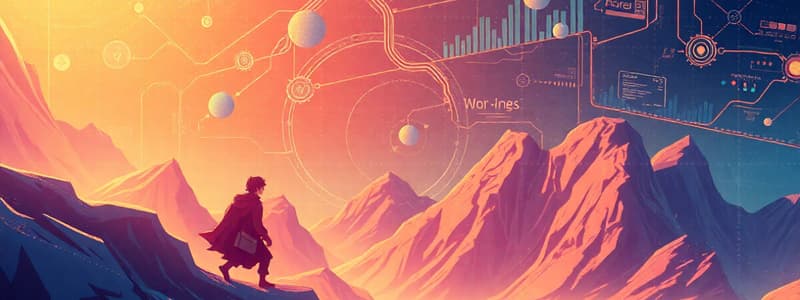Podcast
Questions and Answers
What is a computer?
What is a computer?
An electronic device that accepts, processes, stores, and outputs data at a high speed according to programmed instructions.
What does GIGO stand for?
What does GIGO stand for?
Garbage In, Garbage Out
Which of the following is not a capability of a computer?
Which of the following is not a capability of a computer?
- It can process data quickly.
- It needs human intervention. (correct)
- It can perform operations tirelessly.
- It can confirm the accuracy of information.
The abacus was invented in ancient China.
The abacus was invented in ancient China.
Which of the following machines was invented by Blaise Pascal in 1642?
Which of the following machines was invented by Blaise Pascal in 1642?
Who is credited with being the first computer programmer?
Who is credited with being the first computer programmer?
The first programmable computer is called the _____.
The first programmable computer is called the _____.
Match the following inventions with their inventors:
Match the following inventions with their inventors:
The Difference Engine was steam-powered.
The Difference Engine was steam-powered.
What is the purpose of the input function of a computer?
What is the purpose of the input function of a computer?
What is one limitation of a computer?
What is one limitation of a computer?
Flashcards are hidden until you start studying
Study Notes
What is a Computer?
- An electronic device that processes data according to instructions.
- Composed of five basic elements: electronic, programmable, storage, retrieval, and processing.
- Accepts data as input, processes it, stores it, and outputs the results.
Data and Information
- Data: Raw, unprocessed facts; the input for computers.
- Information: Processed data; the output of computers.
Four Basic Functions of a Computer
- Input: Feeding data into a computer.
- Process: Manipulating and transforming data into useful information.
- Output: Presenting the processed information.
- Storage: Saving data and outputs for future use.
Capabilities and Limitations of a Computer
- Capabilities:
- Processes data quickly.
- Persists in operations.
- Produces accurate results based on instructions.
- Stores, recalls, and retrieves information.
- Verifies accuracy of information.
- Performs multiple tasks.
- Limitations:
- Requires human intervention.
- Has a limited lifespan.
- Cannot produce information independently.
- Outputs depend on user inputs.
- Cannot replace human intelligence.
History of the Computer
Ancient Times
- Abacus: First recorded adding machine, invented in Babylonia around 500 B.C.
- A manual computing device using beads sliding on rods for calculations.
Mechanical Era
- Logarithms: Invented by John Napier in1614. Enabled multiplication and division to be performed with addition and subtraction.
- Pascaline: Mechanical calculator invented by Blaise Pascal in 1642. Performed basic arithmetic operations.
- Stepped Reckoner: Invented by German mathematician Gottfried Leibniz in 1671. Could multiply 5-digit numbers.
- Jacquard Loom: Developed by Joseph-Marie Jacquard in 1822. An automatic weaving machine controlled by punched cards.
- Difference Engine: First modern computer design created by Charles Babbage in 1822. A steam-powered calculating machine for automatically solving mathematical problems.
- Analytical Engine: Also by Charles Babbage. A mechanical machine that took information from punched cards for complex calculations.
- Ada Lovelace: Wrote the first program for Babbage’s Difference Engine. Credited as the first computer programmer. The programming language ADA is named in her honor.
Electromechanical Era
- Punched Card Tabulating Machine: Herman Hollerith used punched cards for census taking in 1890.
- Hollerith's company later became IBM.
- Millionaire: The first efficient four-function calculator invented by Otto Shweiger in 1893.
Electronic Era
- Z3: The first programmable computer built by Konrad Zuse in 1941. It was the first fully functional, program-controlled machine.
Studying That Suits You
Use AI to generate personalized quizzes and flashcards to suit your learning preferences.




